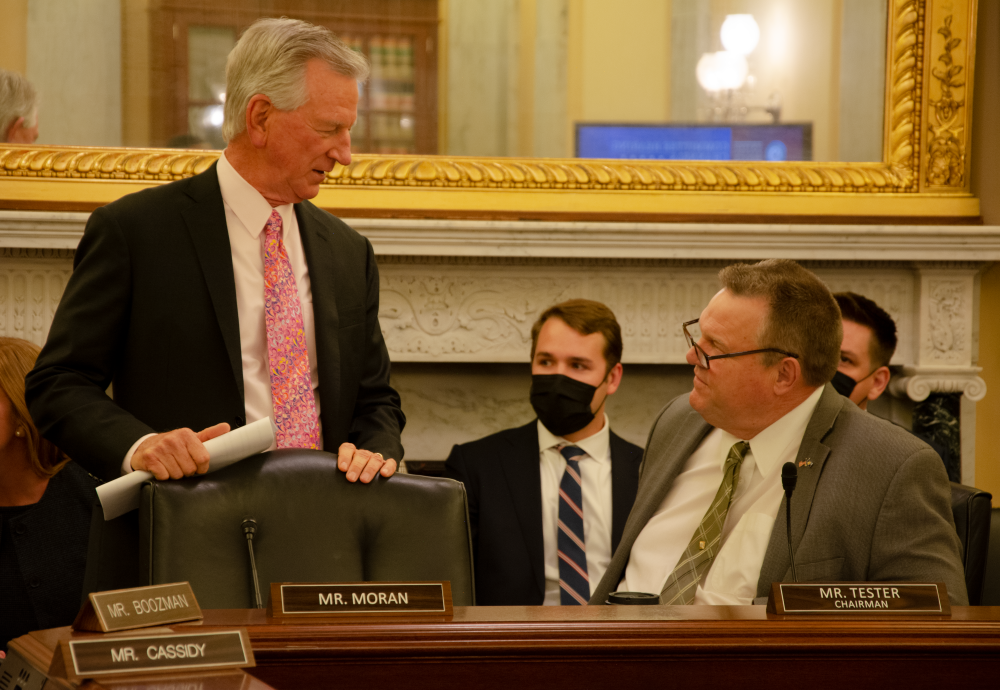WASHINGTON — While homelessness among veterans improved dramatically between 2009 and 2019, thousands remain on the streets – a tragedy lawmakers in both parties are seeking to address in proposed legislation.
In March, Sens. Chris Van Hollen, D-Maryland, Rob Portman, R-Ohio, Elizabeth Warren, D-Massachusetts, and Dick Durbin, D-Illinois, introduced the Improving Housing Outcomes for Veterans Act.
The measure is a response to a May 2020 Government Accountability Office report that, among other things, detailed insufficient coordination on housing between the Department of Veteran Affairs and local housing providers.
Veteran homelessness dropped nearly by half between 2009 and 2019, the GAO found. But as of 2019, there still were more than 37,000 homeless veterans.
“Advocacy groups estimate that many more veterans may be considered at risk of homelessness,” the GAO added.
The GAO recommended that the VA medical centers and providers develop ways to better collaborate local community services; that the VA should make clear to local providers how it measures the effectiveness of veteran housing programs, and that the Department of Labor improve its data collection.
The VA and Department of Labor acted upon those recommendations, according to the GAO.
“Our bill… is designed to codify and fully implement those recommendations so that we can better serve our veterans,” Van Hollen told Capital News Service.
“Our overall goal is to make sure that we are there for our veterans, just as they were there for our country,” he added. “And we need to do that in every area of endeavor, including making sure every veteran has a safe and secure place to call home, a place to live.”
The proposed legislation also would require the VA and the Department of Housing and Urban Development to improve coordination between the agencies’ homelessness programs, and would direct the VA to provide training to community groups serving homeless veterans.
Companion legislation has been introduced in the House by Reps. Anthony Gonzalez, R-Ohio, Kathleen Rice, D-New York, David Joyce, D-Ohio, Bill Johnson, R-Ohio, and Brian Kirkpatrick, R-Pennsylvania.
An April roundtable led by Sen. Jon Tester, D-Montana, later resulted in the creation of a separate bill called the Building Solutions for Veterans Experiencing Homelessness Act.
The proposed legislation would allocate $60 million annually to the Homeless Veterans’ Reintegration Program through the Department of Labor to help unemployed veterans get long-term jobs.
It would also upgrade housing facilities, and create a pilot program for substance use recovery to assist veterans who have been less than honorably discharged.
“We’re looking at maybe putting an omnibus together at the end of the year,” Tester told CNS, referring to a catch-all spending bill that would contain a host of pending legislation. “Those bills certainly are going to be part of the equation for that omnibus, depending on if somebody wants to hold them up or not, and then we’ll also look at other avenues if that doesn’t work.”
Tester is chairman of the Senate Veteran Affairs Committee.
“This is all circular, it’s all intertwined and homeless vets are not something this country should be proud of,” Tester said. “We need to do everything to get them into housing and get them long-term employment, and that’s really the goal here.”
Van Hollen shares that view and is a strong supporter of the HUD-Veteran Affairs Supportive House program, better known as VASH.
The senator said that when he was in the House, he worked on the issue with Ike Leggett, former executive of Montgomery County and a Vietnam War veteran.
“One of the things I’ve been very involved in…is dramatically increasing the amount of VASH vouchers,” Van Hollen said. “Through getting more VASH vouchers, we were able to eliminate veteran homelessness in Montgomery County. We need to do that statewide.”
As a member of the Senate Appropriations Committee, Van Hollen assisted in allocating an additional $50 million for the HUD-VASH program. That boost would provide an estimated 4,650 new rental vouchers for veterans facing homelessness.
The increase is in the fiscal 2022 Transportation, Housing and Urban Development, and Related Agencies spending bill, which hasn’t passed yet.

